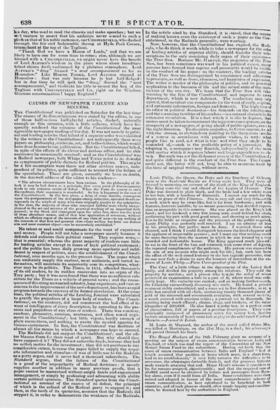Louis Philip, the Queen, the Duke and the Dutchess of
Orleans, were at the Academic Royale on Friday night last. They were all dressed in mourning, on account of the death of the King of England. The King wore the star mid riband of the Legion of Honour. "lhe Duke was dressed in plain black, and the bride had a few white roses in her hair, with a bandeau of diamonds. I cannot say much for the beauty or grace of this Princess. She is very tall and very thin—with a neck which may be swan-like, but is far from handsome ; and with features, however amiable, by no means possessing that decided express sion so acceptable in this country. She was placed on the King's left hand ; and her husband, a very tine young man, stood behind her chair, performing his part with great good sense, and showing as much atten. tion to his bride as etiquette and the presence of the public required, Louis Philip was perfectly well received. I ton no admirer of him or his principles, but justice must be done. I watched those who cheered, and I think I could distinguish between the hired elaquenr and the applause of respectable persons ; and I must say that nothing could be more flattering than the manner in which he was treated by a very crowded and fashionable house. The King appeared much pleased: he sat in the front of the box, and returned, with some show of dignity, the repeated compliments of the audience. His person was exposed to the aim of any assassin who might seek his life ; but, such bas been the effect of the well.cimed leniency to the last regicide pretender, that no one now feels a desire to earn the honours of martyrdom at the ex. pense of Louis Philip.—Paris Correspondentof the Post.
The Cure of a little village in the department of the Loiret died lately, and divided his property among his relatives. They sold the property by auction ; and a person who lu u;ht the cellar of wines perceived on examination a hole in a part of' it, where wood was ordi- narily kept. His curiosity was excited ; and on making further search, the following extraordinary discovery was made. He found a priest's vestment richly embroidered, and a cross set in fine diamonds; next, a little box covered with oil-cloth, containing twenty thousand pieces of gold of the sixteenth and seventeenth centuries, with several meth's; a watch covered with precious rubies ; a portrait set in diamonds, the painting being much effaced ; chains, rings, and trinkets, of the value altogether of 500,000f. Ile also found a cedar box, in a perfect state of preservation, full of papers of a peculiar description. They were principally composed of promissory notes for money lent, besides various memoranda of heavy sums lost at play to the celebrated Cardinal nand°. —Journal de Loiret.
M. Louis de Nlaynard, the author of the novel called Outre 2Ifer, was killed at Martinique, on the Olst May, in a duel; his adversary's ball passed through his heart.
The Bengal Barham of the 18th February gives an account of a meeting on the subject of steam communication between India and EnAland, at which was read the report of the Committee of the New Bengal Steam Fund to the subscribers. Having set forth that the cause of steam communication between India and England " kid at length assumed that position at home which must, in a short time, lead to its establishment," it very fully narrates the difficulties to be overcome, the advantages derivable from it, and the progress hitherto made towards attaining that end. Major Head's scheme it considers to be, for reasons assigned, objectionable ; and that the required sum of 58,0001. could never be obtained by letters and passengers from Bom- bay alone, even if it could from all India. Some resolutions were then moved and adopted in favour of the most comprehensive scheme of steam communication, as best calculated to be beneficial to both countries, and of such plans as should, after ample inquiry and consider- ation, be deemed best by the authorities in England.


























 Previous page
Previous page